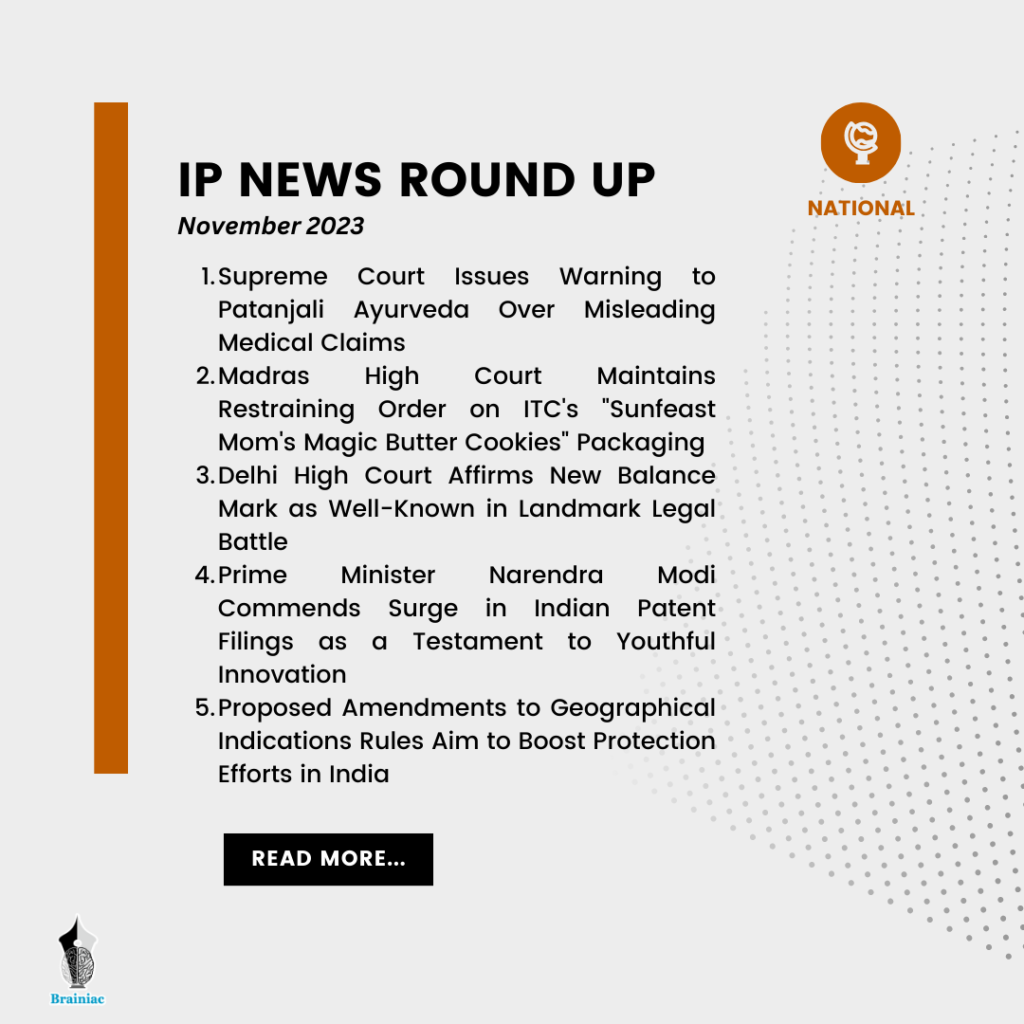1. Supreme Court Issues Warning to Patanjali Ayurveda Over Misleading Medical Claims
In a significant move, the Supreme Court has warned Patanjali Ayurved against disseminating false and misleading claims about the curative properties of its medicines. This directive comes in response to a plea by the Indian Medical Association (IMA), accusing Patanjali’s founder, Ramdev, of a smear campaign against vaccination drives and modern medicine. The court has specifically instructed Patanjali to cease such misleading claims and may impose fines of Rs 1 crore per product for false assertions. The broader concern over misleading medical advertisements and their potential impact on public health has prompted the court to urge the Centre to address this issue. This decision follows previous criticism of Ramdev for derogatory remarks against allopathy, emphasizing the need to safeguard the integrity of medical information.
2. Madras High Court Maintains Restraining Order on ITC’s “Sunfeast Mom’s Magic Butter Cookies” Packaging
In a recent development, the Madras High Court has chosen not to intervene in a restraining order against ITC Limited regarding the sale of “Sunfeast Mom’s Magic Butter Cookies” packaged in a blue wrapper that closely resembles Britannia Good Day biscuits. Britannia Industries Limited initiated the case, alleging that ITC’s use of an identical blue wrapper exploited Britannia’s established reputation, considering ITC’s historical use of red packaging. Britannia sought a permanent injunction, damages totaling Rs 65 Lakh, and the surrender of offending materials. ITC argued that the shift to a blue wrapper followed an industry trend, and the wrappers were distinct. Nevertheless, the court found ITC’s explanation insufficient, attributing intentional arrangement and deceptively similar elements to ITC. The bench upheld the single judge’s decision, confirming a prima facie case for an injunction without interference. However, ITC has been permitted to deplete its existing stock packaged in the disputed blue wrap.
3. Delhi High Court Affirms New Balance Mark as Well-Known in Landmark Legal Battle
In the legal dispute between New Balance Athletics Inc. and New Balance Immigration Private Limited, the Delhi High Court, under Justice Prathiba M. Singh, officially designated New Balance’s footwear and apparel marks as “well-known.” The court stressed that exclusive rights to the terms ‘New’ and ‘Balance’ separately should not exist concerning other goods or services. It highlighted the distinctive nature of the novel ‘NEW BALANCE’ mark and the consistent legal protection of the New Balance logo [NB] against misuse. The case, initiated against the unauthorized use by New Balance Immigration Private Limited, concluded with a summary judgment decreeing the suit. The court, referencing Section 11(6) of the Trade Marks Act, considered factors such as public recognition, usage duration, promotion extent, and enforcement history in establishing the well-known status. Advocates representing New Balance presented a robust case, while the defendant’s counsel was notably absent. This legal precedent solidifies New Balance’s position in the industry, underscoring the significance of well-known declarations in trademark law.
4. Prime Minister Narendra Modi Commends Surge in Indian Patent Filings as a Testament to Youthful Innovation
Prime Minister Narendra Modi has lauded the substantial increase in patent applications in India, considering it a strong indicator of the burgeoning innovative spirit among the nation’s young population. The praise comes in response to a report from the World Intellectual Property Organization, revealing a notable 31.6% upswing in patent applications by Indian residents in 2022. This growth marks an unprecedented 11-year trend, surpassing the performance of any other country within the top 10 filers. Despite China maintaining a dominant position in global patent applications, the report underscores India’s substantial growth. The contrast with a declining growth rate in China for the second consecutive year highlights India’s positive trajectory. Prime Minister Modi underscored the optimistic implications for the nation’s future, recognizing the vibrant innovation landscape taking shape.
5. Delhi High Court Slams Counterfeit Trade: Awards Rs. 11 Lakhs Damages in Landmark Trademark Infringement Case
In a big win, the Delhi High Court, under Justice Prathiba M. Singh, granted Rs. 11 lakhs as damages and costs to Aero Club in a trademark infringement case against Sahara Belts. The court issued a permanent ban, stopping Sahara Belts from making, selling, or advertising any products with the ‘WOODLAND’ trademark owned by Aero Club. The decision was based on proof that Sahara Belts sold fake ‘WOODLAND’ products, leading to the seizure of over 11,000 fake items. The court stressed the harmful impact of fake sales on real products and acknowledged Sahara Belts’ intentional copying. The court awarded Rs. 10 lakhs in damages and Rs. 1 lakh in costs to Aero Club, showing the court’s commitment to protecting intellectual property and preventing fake goods from diluting the market.
6. Madras High Court Recognizes Apollo Trademark as Well-Known, Grants Relief in Infringement Suit
In a recent landmark decision, the Madras High Court has recognized the trademark “Apollo” as a well-known mark in the healthcare and pharmaceutical industry, granting relief to Apollo Hospitals Enterprises Ltd in a trademark infringement suit. Justice Abdul Quddhose, presiding over the case, acknowledged Apollo’s entitlement to the highest level of protection, declaring the “Apollo” mark a well-known trademark. The court affirmed Apollo’s proprietary rights over trademarks and variants, issuing a permanent injunction against Dr. Dheeraj Saurabh, proprietor of New Apollo Hospital in Bihar, restraining the unauthorized use of similar marks. The decision emphasized Apollo’s fulfillment of criteria for well-known status, including public knowledge, duration of use, advertising methods, and geographical extent. The court held that the defendant’s use of a deceptively similar mark with dishonest intent constituted both trademark infringement and passing off, protecting Apollo’s brand integrity.
SCase Title: Apollo Hospitals Enterprises Ltd v Dr Dheeraj Saurabh
7. Proposed Amendments to Geographical Indications Rules Aim to Boost Protection Efforts in India
The Draft Geographical Indications of Goods (Registration and Protection) (Amendment) Rules, 2023, have been welcomed as a positive step to encourage more entities to seek Geographical Indication (GI) protection in India. The amendments focus on reducing fees for various forms related to GI applications and registration. However, legal experts emphasize that larger issues within the Geographical Indications of Goods (Registration and Protection) Act, 1999 need attention. Suggestions include ensuring producer involvement in the application process, implementing quality control measures, and introducing provisions for the assignment or transfer of GIs. Additionally, recommendations include omitting registration requirements for authorized users, proposing a more streamlined system for GI protection. These amendments, if implemented, aim to enhance India’s GI protection framework, offering comprehensive safeguards for registered GIs and stakeholders.




